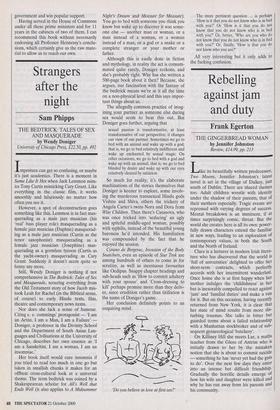Strangers after the night
Sam Phipps
THE BEDTRICK: TALES OF SEX AND MASQUERADE by Wendy Doniger University of Chicago Press, £22.50, pp. 492 Imposture can get so confusing, or maybe it's just academics. There is a moment in Some Like It Hot when Jack Lemmon mim- ics Tony Curtis mimicking Cary Grant. Like everything in the classic film, it works smoothly and hilariously no matter how often you see it.
However, a spot of deconstruction goes something like this. Lemmon is in fact mas- querading as a male jazz musician (his `real' bass player role) masquerading as a female jazz musician (Daphne) masquerad- ing as a male jazz musician (Curtis as the tenor saxophonist) masquerading as a female jazz musician (Josephine) mas- querading as a gormless tycoon (Curtis as the yacht-owner) masquerading as Cary Grant. Suddenly it doesn't seem quite so funny any more.
Still, Wendy Doniger is nothing if not comprehensive in The Bedtrick: Tales of Sex and Masquerade, scouring everything from the Old Testament story of how Jacob mis- took Leah for Rachel (in the Biblical sense, of course) to early Hindu texts, film, theatre and contemporary news items.
Nor does she lack a sense of humour. Citing e. e. cummings' protagonist — 'I am an Artist, I am a Man, I am a Failure' Doniger, a professor in the Divinity School and the Department of South Asian Lan- guages and Civilisations at the University of Chicago, describes her own essence as 'I am a Sanskritist, I am a woman, I am an insomniac.'
Her book itself would cure insomnia if you tried to read too much in one go but taken in smallish chunks it makes for an offbeat cross-cultural look at a universal theme. The term bedtrick was coined by a Shakespearean scholar for All's Well that Ends Well (it also applies to A Midsummer Night's Dream and Measure for Measure). You go to bed with someone you think you know but wake up to discover it was some- one else — another man or woman, or a man instead of a woman, or a woman instead of a man, or .a god or a snake or a complete stranger or your mother or father.
Although this is easily done in fiction and mythology, in reality the act is consum- mated quite rarely, Doniger reckons, and she's probably right. Why has she written a 500-page book about it then? Because, she argues, our fascination with the fantasy of the bedtrick means we're at it all the time on a non-physical level and this says impor- tant things about us.
The allegedly common practice of imag- ining your partner as someone else during sex would seem to bear this out. But Doniger goes further, arguing that
sexual passion is transformative, at least transformative of our perspective; it changes our view of our partner. Sometimes we go to bed with an animal and wake up with a god; that is, we go to bed relatively indifferent and wake up enchanted by sexual magic. On other occasions, we go to bed with a god and wake up with an animal; that is, we go to bed blinded by desire and wake up with our eyes relatively cleared by satiation.
So much for reality; it's the elaborate machinations of the stories themselves that Doniger is keener to explore, some involv- ing the murderous transsexual Hindu gods Vishnu and Shiva, others the trickery of Angela Carter's twins Nora and Dora from Wise Children. Then there's Casanova, who was once tricked into 'seducing' an ugly and spiteful middle-aged woman, possibly with syphilis, instead of the beautiful young baroness he'd intended. His humiliation was compounded by the fact that. he enjoyed the session.
Cyrano de Bergerac, Invasion of the Body Snatchers, even an episode of Star Trek are among hundreds of others to come in for scrutiny, as well as incestuous favourites like Oedipus. Snappy chapter headings and sub-heads such as 'How to commit adultery with your spouse' and 'Cross-dressing to kill' perhaps promise more than they deliv- er, since erudition rather than titillation is the name of Doniger's game.
Her conclusion definitely points to an enquiring mind.
`Do you believe in love at first sex?'
The more pertinent question ... is perhaps `How is it that you do not know who is in bed with you?' Or 'How is it that you do not know that you do not know who is in bed with you?' Or, better, 'Who are you who do not know that you do not know who is in bed with you?' Or, finally, 'How is that you do not know who you are?'
All very interesting but it only adds to the fucking confusion.

























































































 Previous page
Previous page